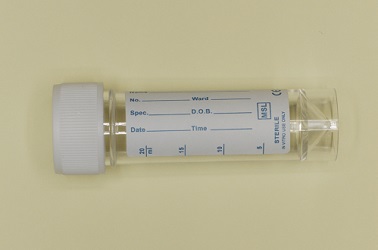Diuretic Screen UAHS
Specimen Volume
Minimum volume 0.5 mL.Specimen Transport
First class postSample Preparation
Turnaround Time
1 weekSample Processing In Laboratory
Place in toxicology box in cold room.Sample Stability
Store at -20 °CGeneral Information
Arterial hypertension is one of the most preventable causes of premature morbidity and mortality with resistant hypertension reported to be present in 5 to 30% of the total hypertensive population. The resistant hypertensives have much worse prognosis. Poor adherence with prescribed medication is a common cause of resistance to treatment, with as many as 53% reported to be non-adherent.
This Urinary Anti-Hypertensive Drug Screen by LC-QTof MS is an objective test of adherence which is easy to administer, quick, inexpensive and reliable and may be used to identify patients with true resistance to antihypertensive treatment.
As of 1st of May 2019, the following drugs are screened for:
|
ACE inhibitors Ramipril, Enalapril, Lisinopril, Quinapril, Perindopril, Fosinopril |
Calcium Channel blockers Amlodipine, Felodipine, Lercanidipine, Lacidipine, Nifedipine, Diltiazem, Verapamil |
Beta Blockers Atenolol, Bisoprolol, Labetolol, Metoprolol, Propranolol, Carvedilol, Nebivolol |
|
Angiotensin II Receptor Antagonists Candersartan, Olmesartan, Losartan, Telmisartan, Valsartan, Irbesartan
|
Diuretics Chlorothiazide, Hydrochlorothiazide, Bendroflumethiazide, Indapamide, Bumetanide, Metolazone, Chlorthalidone, Amiloride, Furosemide, Spironolactone |
Anti-diabetic Drugs Chlorpropamide, Glibenclamide, Glimepiride, Gliclazide, Glipizide, Tolbutamide and Metformin
|
|
Renin Inhibitors Aliskiren
|
Statins Atorvastatin, Rosuvastatin
|
Others Clonidine, Doxazosin, Minoxidil, Moxonidine |
Other drugs such as those used for treatment of heart failure (e.g. ivabradine), anticoagulant drugs (e.g. warfarin, rivaroxaban), antiplatelet drugs (e.g. clopidogrel) and gliptins (e.g. sitagliptin) are screened for but are not reported. If a requesting physician requires adherence to these drugs to be investigated please contact the laboratory on 0121 424 3707.
This screening test is accredited to ISO 15189 under flexible scope.
Patient Preparation
For patients:
First pass urine of the day should be collected into a plain (white top) universal container. Prescribed medication should be taken as usual.
For requesting clinical staff:
Please state name and dose of drugs prescribed, together with the time patient has been instructed to take medication, on the request form. Transport to the laboratory as soon as possible.
Reference Range
This is a screening tests. Drugs detected in specimens will be stated on the report.
Specifications
- EQA Status: LGC TDM Scheme
- EQAS Scheme: Yes








